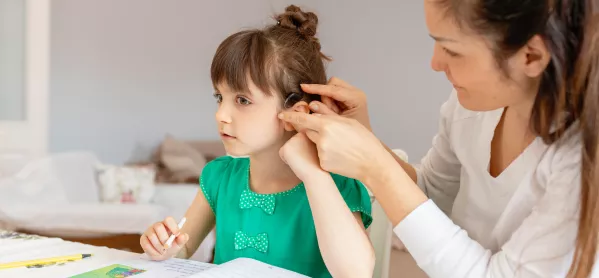“Shocking” disparities in support for deaf pupils across England have been revealed by new research, which shows that 40 out of 150 councils now have no specialist teaching units for deaf children.
The research, portrayed through a new interactive map launched by the National Deaf Children’s Society (NDCS), shows that nearly one in 10 units (9 per cent) had closed in the past five years, with just 237 now remaining.
This compares with the 260 units operating in 2016, when records began.
The NCDS said specialist units for deaf pupils are an important option for parents when deciding where to send their children to school, as they enable deaf children to be educated alongside their peers with additional support in a mainstream setting.
The support in these units, which are part of mainstream schools, can include one-to-one teaching, help from specialist teachers and help with technology, such as hearing aids.
There are currently an estimated 45,000 deaf pupils in England.
The figures come amid longstanding concerns about capacity within the special school system and a need for more specialist support.
In December, education minister Will Quince said the long-awaited SEND review would bring a “huge overhaul of the system”.
He wrote in an open letter to young people and parents that he wanted to reduce local variation in support, improve early intervention and, most importantly, ensure that there is funding and accountability in place to deliver what is needed.
Shortage of specialist units for deaf children
The charity’s map reveals stark regional disparities in the support that deaf pupils can access across the country.
In Dorset (which has a total of 843 deaf children to support) and Staffordshire (763), there are no specialist units at all.
In Devon, there is one unit for every 525 deaf children in the area - far above the national average of one per 190.
Lack of specialist teachers
The map also highlights several areas with low numbers of teachers of the deaf, who visit deaf pupils, families and schools to provide support.
While the national average is one teacher of the deaf for every 62 deaf pupils, in Hillingdon, West London, the ratio is one per 212.
In Derby, there is one specialist teacher for 151 pupils.
Support is a ‘postcode lottery’
The NDCS argues that support for deaf pupils has become a “postcode lottery” and that local authorities and schools are not doing enough to invest in specialist units or make parents aware that they are available.
Now the charity is calling on the Department for Education to improve support.
Mike Hobday, director of policy and campaigns at the NDCS, said specialist units can give deaf children support, help with technology and give them the chance to be educated alongside their hearing peers.
He added that the units also offer a chance for deaf pupils to find friends who are also deaf.
Mr Hobday said: “Every time a unit is closed, families in that area have fewer options for the future of their deaf child’s education and this is just one aspect of the shocking disparities that now exist.
“Support for deaf children has become a postcode lottery and some people don’t even get a ticket.”
Mr Hobday added that the DfE and local authorities must look urgently at this situation, and said he hoped the interactive map would help parents and deaf young people in the interim.
A DfE spokesperson said: “All children and young people, including those who are deaf or have a hearing impairment, should receive the support they need to succeed in their education.
“That’s why there is a legal requirement for qualified teachers to hold relevant mandatory qualifications when teaching classes of pupils who have a sensory impairment.
“Initial teacher training also equips qualified teachers with the skills to teach and support all pupils, including those with special educational needs.”




